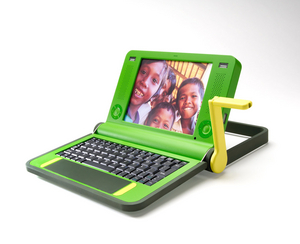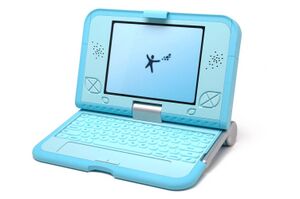Um Laptop por Criança
O MIT Media Lab lançou uma nova iniciativa de pesquisa para desenvolver um laptop de US$ 100, uma tecnologia que pode revolucionar a forma como educamos as crianças no mundo. Para alcançar esse objetivo foi criada uma nova organização sem fins lucrativos, a One Laptop per Child (OLPC). (Veja a página oficial do projeto laptop.org.) Note que há uma ampla descrição do projeto na Wikipedia.
O hardware
O protótipo Green Machine (Máquina Verde), projetado pela Design Continuum, foi apresentado em WSIS, Tunisia, pelo Secretário Geral das Nações Unidas Kofi Annan e pelo Nicholas Negroponte.
Fuse-product desenvolveu alguns protótipos mais recentes: a Blue Machine (Máquina Azul) e a Yellow Machine (Máquina Amarela).
We are also zeroing in on the hardware specification for the first generation machine.
The software
We are committed to the principle of Open Source for this project. Please refer to our manifesto: OLPC on open source software.
Developing software for this machine is very straight forward, though there are development issues you should be aware of. Our partner in software development is Red Hat. We expect the release of a beta version of the SDK including an emulator in early February.
We have begun an OLPC software task list. Please help us refine this list .
Discussion of Instant Messaging Challenges lays a framework for thinking about the different challenges facing the use of instant messaging applications as they exist today on the $100 laptop. Those issues will need to be overcome if instant messaging is to be usable within the environments in which the $100 laptop will be deployed.
Discussion of eBook feature set is a page in which traditional and nontraditional features are discussed both in abstract and in relation to the different eBook readers out there.
Educational content
OLPC is based on "constructionist" theories of learning pioneered by Seymour Papert and later Alan Kay, as well as the principles expressed in Nicholas Negroponte's book 'Being Digital'. Some background on our approach can be gleaned from David Cavallo's essay, "Models for growth—towards fundamental change in learning environments".
Launch plans
The laptops will be sold to governments and issued to children by schools on a basis of "one laptop per child." Initial discussions have been held with China, India, Brazil, Argentina, Egypt, Nigeria, and Thailand. An additional, modest allocation of machines will be used to seed developer communities in a number of other countries. A commercial version of the machine will be explored in parallel.
There is are a series of pages in this wiki dedicated to OLPC_Thailand. Similar pages from other potential launch countries (OLPC_Brasil, OLPC_Argentina, OLPC_Egypt, OLPC_Nigeria, OLPC_India, OLPC_China, and OLPC_Massachusetts) will follow.
Getting involved
There is a page in this wiki dedicated to Getting involved in OLPC and an OLPC Idea Pool.
FAQ
The official FAQ is on the project website, but please feel free to pose additional questions here: OLPC FAQ.


